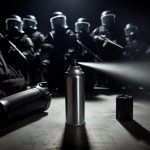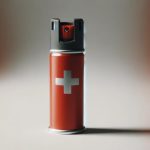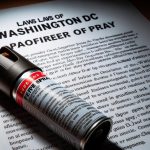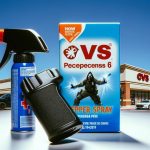Pepper spray, also known as OC spray or mace, has become a popular tool for self-defense among many individuals in Canada. But before you go out and purchase a canister of this potent substance, it’s important to understand the legal implications that come with its possession and use.
The topic of pepper spray’s legality in Canada has sparked much debate and confusion. While it may seem like a simple and harmless tool, the reality is that it is classified as a prohibited weapon under the Criminal Code of Canada. This means that without a valid permit or license, it is illegal to possess or use pepper spray for any purpose in the country.
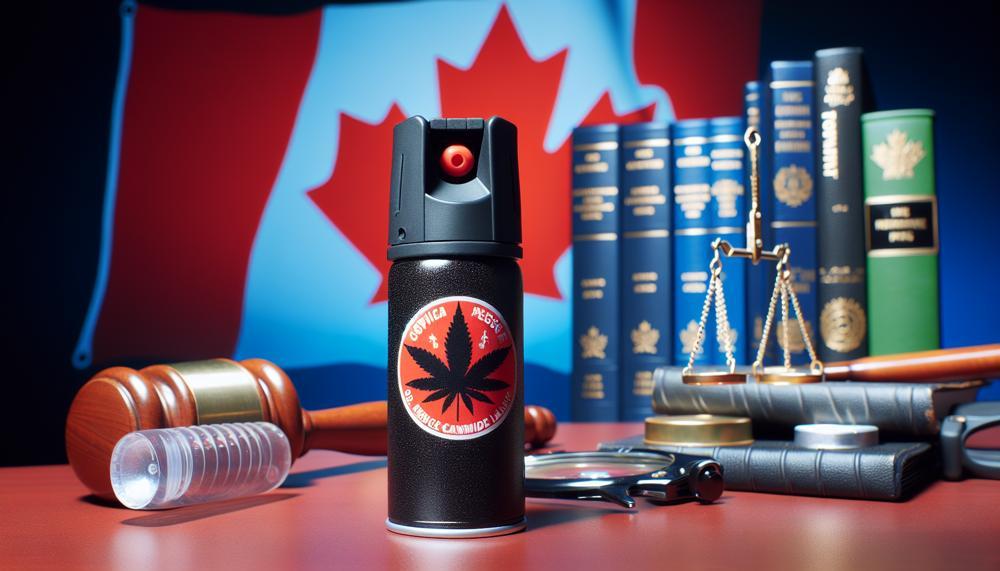
There are exceptions to this rule, such as law enforcement officers who are authorized to carry pepper spray as part of their duty. However, for the average person looking to protect themselves, obtaining a permit is necessary. Failure to do so can result in fines, imprisonment, or both.
But even with a valid permit, there are restrictions on where and how pepper spray can be used. It is not something that should be taken lightly or used recklessly.
In fact, individuals must go through a rigorous application process and meet certain criteria set by their province or territory in order to obtain a permit for pepper spray.
Contents
Is Pepper Spray Illegal in Canada?
Yes, pepper spray is illegal in Canada.
It’s considered a prohibited weapon under the Firearms Act and the Canadian Criminal Code. This means that it’s illegal to own, make, sell, or use pepper spray in Canada.
Even using pepper spray for self-defense can lead to criminal charges.
Penalties for weapon offenses in Canada can include long-term imprisonment and a criminal record.
In Canada, bear spray or dog spray are allowed to fend off wild animals and can’t be used on humans.
Differences Between Pepper Spray and Bear Spray
Pepper spray and bear spray are two common self-defense tools, each with its own unique set of characteristics that make them effective in different situations. While both contain capsaicinoids, the active ingredient that causes the burning sensation, they serve different purposes and have distinct characteristics.
Pepper spray is specifically designed for personal defense against humans. It contains a lower concentration of capsaicinoids compared to bear spray, making it less potent. However, it still packs a punch and can cause intense pain, temporary blindness, and difficulty breathing when sprayed on someone’s face. Its range is typically limited to 6-12 feet, making it more suitable for close encounters.
On the other hand, bear spray is specifically formulated to deter aggressive bears and other large wild animals. It contains a higher concentration of capsaicinoids, making it more potent and effective at a longer range. With an effective range of up to 30 feet, it provides a safer distance between the user and the animal.
Legally, pepper spray falls under self-defense laws and may have restrictions on its use depending on the state and concentration levels of active ingredients. In contrast, bear spray is designated as an animal repellent and is generally legal to use in most states.
In Canada, pepper spray is legal for self-defense purposes but must be labeled as such and cannot be used for any other purpose. However, it is prohibited for other uses due to its potential as an offensive weapon. The only exception is for animal repellent spray, such as bear spray, which is legal for use against animals.
Some Effects Pepper spray
When used as a self-defense tool in Canada, pepper spray can result in a range of effects on an individual depending on the strength and amount used. These effects may include:
- A Burning Sensation: The key ingredient in pepper spray, capsaicin, is derived from chili peppers. When sprayed onto someone’s face, it causes a burning sensation on the skin, as well as in the eyes, nose, and throat.
- Temporary Blindness: Pepper spray can temporarily blind an individual by forcing them to close their eyes and experience intense tearing and redness.
- Coughing and Disorientation: Along with the burning sensation and temporary blindness, pepper spray can also trigger coughing and disorientation, making it challenging for the attacker to continue their assault.
- Irritation of Mucus Membranes: The capsaicin in pepper spray can also irritate the mucus membranes in the eyes, nose, and throat, leading to severe discomfort.
- Breathing Difficulties: In some cases, the immediate effects of pepper spray can cause breathing difficulties due to the irritation and inflammation caused by capsaicin.
- Skin Irritation: If pepper spray comes into contact with exposed skin, it can also cause irritation and redness.
- Temporary Incapacitation: The combination of these effects can temporarily incapacitate an attacker, giving the victim time to escape or seek assistance.
| Effects of Pepper Spray on an Individual | Description |
| Burning Sensation | he main ingredient, capsaicin, causes a burning sensation on the skin, eyes, nose, and throat. |
| Temporary Blindness | Can temporarily blind an individual by causing eye closure and intense tearing. |
| Coughing and Disorientation | Results in coughing and disorientation, disrupting the attacker’s ability to continue their assault. |
| Irritation of Mucus Membranes | Irritates mucus membranes in the eyes, nose, and throat, causing discomfort. |
| Breathing Difficulties | May cause breathing difficulties due to inflammation caused by capsaicin. |
| Skin Irritation | Contact with exposed skin can cause irritation and redness. |
Conclusion
In summary, the use of pepper spray in Canada may appear to be a simple solution for self-protection, but its legality should not be underestimated. As previously mentioned, it is considered a prohibited weapon and can only be carried for the purpose of animal defense.
And even in that case, there are strict rules and potential repercussions to keep in mind.
It is imperative for individuals to have a thorough understanding of the laws surrounding pepper spray before considering it as a form of defense.
Always remember, self-protection should never put you in conflict with the law. Stay well-informed and stay safe.

